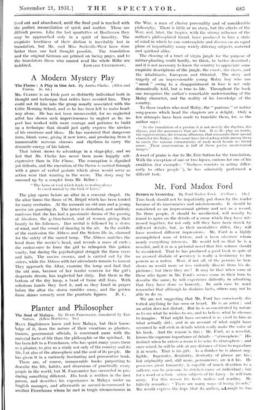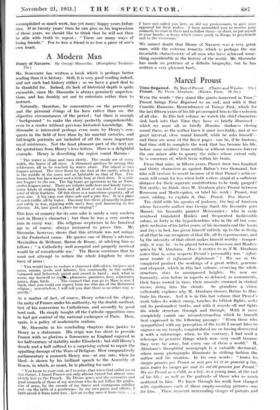Mr. Ford Madox Ford
Return to Yesterday. By Ford 11ladox Ford. (it :ollancz. 113.s.) Tins book should not be impatiently put down by the reader because of its inaccuracies and misstatements. It should be considered as an impressionist picture and not as a record. No three people, it should be recollected, will usually be found to agree on the details of a scene which they have wit- nessed together, for not only will they have been struck by different details, but, as their mentalities differ, they will have received different impressions. Mr. Ford is a highly accomplished man of letters, and a keen observer whom nearly everything interests. He would tell us that he is a novelist, and it is as a pictorial novel that this volume should be coasidered. That be has produced a good hook in spite of an avowed disdain of accuracy is really a testimony to his powers as a writer. . Most, if not all, or the persons he here shows us would more or less violently dissent from his de- pictions ; but there they are ! It may be that when sonic of those who figure in Mr. Ford's scenes come in their turn to describe the same, he will experience difficulty in admitting that they have done so honestly. In such ease he must remember that although he disdains facts, others may not be able to-do so.
We are not suggesting that Mr. Ford has consciously dis- torted anything he has seen or heard. Ile is an artist ; and an artist does not distort. But he is so constituted by nature as to see what he wishes to see, and to believe what he chooses to imagine. What might have occurred is as vivid to him as what actually did ; and in an account of what might have occurred he will etch in details which really make the value of his book. And the reason is this : Mr. Ford, as a novelist, knows the supreme importance of details—" at niospliere." His instinct when he enters a room is to seize its atmosphere ; and once seized, he will be able at any distance of time to reproduce it in words. That is his gift. As a thinker he is almost neg- ligible. Ingenuity, flexibility, dexterity of phrase are his ; but originality and, still more, permanence, are n rt his. Ile possesses great humanity, is capable of much devotion to a sufferer, can be genet ou to stricken cause or individual ; but for a word or a look--often subjects of his fancy—he will turn away. For this reason his book 'nukes sad reading. lie bitterly remarks : " There arc many ways of losing friends." We would express the hope that its author, a.taough he has accomplished so much work, has yet many happy-years;hefore him. If in twenty. years' time he can give us :his impressions of those years, we should like to think that he will not then be able with truth to repeat : " There arc many ways of losing friends." For to lose a friend is to lose a piece of one's own heart.

































































 Previous page
Previous page